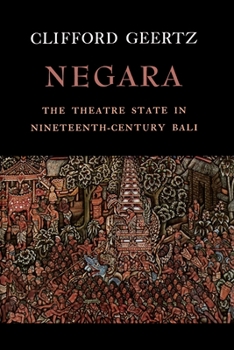Negara: The Theatre State in Nineteenth-Century Bali
Select Format
Select Condition 
Book Overview
Combining great learning, interpretative originality, analytical sensitivity, and a charismatic prose style, Clifford Geertz has produced a lasting body of work with influence throughout the humanities and social sciences, and remains the foremost anthropologist in America.
Format:Paperback
Language:English
ISBN:0691007780
ISBN13:9780691007786
Release Date:January 1981
Publisher:Princeton University Press
Length:312 Pages
Weight:1.00 lbs.
Dimensions:0.8" x 5.9" x 9.2"
Customer Reviews
3 ratings
Negara
Published by Thriftbooks.com User , 15 years ago
The pleasure of the prose alone is worth the price of this book. I was interested in what Geertz had to say and found the book hard to put down. Neatly done and neatly argued.
Negara: The Theatre State in Nineteenth Century Bali
Published by Thriftbooks.com User , 20 years ago
Geertz, a social anthropologist at the Institute for Advanced Study at Princeton University, is a prolific scholar on Balinese and Indonesian political and state organization. "Negara" is a Sanskrit word which originally meant "town"; in Bahasa Indonesia it now signifies nation or realm--the seat of political authority. Its opposite is "desa," the village, place, region, or governed area. Between these two contrasting poles-negara and desa-the classical polity developed. In his search for the "negara," the traditional state of pre-colonial Bali, he casts a wide analytical net over the cultural streams that flowed unchecked in to the archipelago for over 3,000 years from India, China, the Middle East, and Europe. Foreign contact/intervention left a permanent stamp on the island chain in the form of a Hindu civilization on Bali, Chinatowns in Jakarta, and a multiplicity of social structures, economic forms and kinship organizations. Geertz traces the sociological and historical interplay of state formation and dissolution and power and status distribution in 14th to 19th century Bali-an island symbolically caught in a parallel tug of nature between the tranquil Java sea to the north and the treacherous Indian Ocean to the south. Heavy on political theory, this book is more suitable for academicians, history buffs, and college students than for the general reader or the package holiday tourist. Substantiated by critical reviews of the scholarly literature, 130 pages of explanatory footnotes, and a lengthy bibliography, Negara puts forth a persuasive final model of the Balinese state as a distinctive political order. To understand Bali's past, is to understand Bali's present and future.
""Tis nothing but a Magic Shadow-show"
Published by Thriftbooks.com User , 21 years ago
Bali flits in and out of the Western imagination: Conradian tropic kingdoms, National Geographic star attraction, Mead-Covarrubias-Belo-Geertz himself, tourist paradise (ever-fading). What is Bali all about besides emerald rice terraces, bare breasted beauties, cheap surfing holidays, and tremendously elaborate ceremonies featuring gamelan orchestras and graceful dancers ? Bali is indeed a mystery. If you approach NEGARA with the desire to learn more about this marvelous Indonesian island, you may go away disappointed. There are no Balinese voices in the book; modern Bali is hardly discussed.NEGARA is an important book, but for those who specialize in the study of Southeast Asian kingdoms, for those who would like to question the standard Western method of studying political power, and for those interested in 19th century Balinese history as interpreted by America's foremost anthropologist, who is rather more known for creative (I'm with him) interpretations than for intensive field work. Geertz' work is going to last a very long time---something that can hardly be said about most anthropological writing. The reason is that he constantly sees things in a different way and can express his vision very clearly. His other books on Indonesia, for example "The Religion of Java", "Islam Observed", "Pedlars and Princes" and "Agricultural Involution" have all been classics for years. His article on the Balinese cockfight is one of the most seminal anthropological pieces ever written.The Balinese state did not specialize in tyranny, conquest or effective administration. Its emphasis was on "spectacle, toward ceremony, toward the public dramatization of the ruling obsessions of Balinese culture: social inequality and status pride. It was a theatre state..." All the elaborate productions created were "not means to political ends: they wre the ends themselves, they were what the state was for......Power served pomp, not pomp power." (p.13) Geertz spends most of the 136 page book proving this point. [There are also 120 pages of notes.] There are detailed discussions of descent groups, client relationships, three major varieties of village organization aimed at administration, irrigation, and worship, and the connection between court and village. Then follows the scrutiny of ritual, ceremony, and symbols in Geertz' inimitable style. The point must be taken: Balinese society was one of unending rivalry for prestige among very-established levels of hierarchy which were, nonetheless, extremely fluid. The endless reiteration in symbolic, ceremonial terms of a fixed set of relations made up the Balinese theater state. NEGARA, not a new book, is by now established as a classic text in Anthropology courses, in Religious Studies, Political Science, and Southeast Asian Studies in universities around the world. It portrays a political system that did not conform to the usual Western idea of what political power is all about. Geertz writes that he wa




